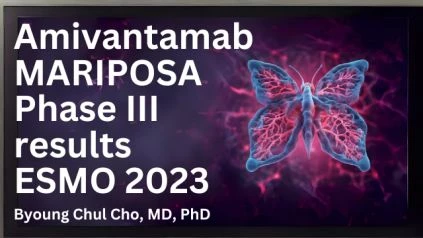By: Byoung Chul Cho, MD, PhD, Yonsei University, Seoul, Korea,
Date: 11/03/2023
Courtesy: VJOncology
Above is a video from Byoung Chul Cho, MD, PhD, Yonsei University, Seoul, Korea about the MARIPOSA Phase 3 trial a randomized study comparing amivantamab plus lazertinib compared to osimertinib in advanced EGFR mutated lung cancer. During this ESMO 2023, the primary and some secondary endpoints of the MARIPOSA study were presented.
The primary endpoint of the MARIPOSA study aimed to evaluate the progression-free survival (PFS) of amivantamab plus lazertinib compared to osimertinib according to RECIST version 1.1. The secondary endpoints included overall survival, duration of response, and PFS2. Concerning PFS, the study demonstrated a statistically significant and clinically meaningful improvement with amivantamab plus lazertinib compared to osimertinib. The median PFS was 23.7 months for amivantamab plus lazertinib compared to 16.6 months for Tinib, with an HR of 7 and a p-value of less than 0.001. Additionally, there was a 25% reduction in second disease progression or death with amivantamab plus lazertinib.
The overall survival analysis showed a strong trend favoring amivantamab plus lazertinib, even though the median overall survival was not estimable in both groups.
In terms of safety, the incidence of treatment-emergent adverse events was higher with amivantamab plus lazertinib compared to osimertinib. However, treatment-related adverse events leading to discontinuation were more frequent in the amivantamab plus lazertinib group (10%) compared to the osimertinib group (3%). Most adverse events in the amivantamab plus lazertinib group were related to on-target EGFR mutations and were mostly of grade one or two. There was also a higher incidence of venous thromboembolism (VTE) in the amivantamab plus lazertinib group. However, most VTE events were of grade one or two and effectively managed with anticoagulation.
Based on the MARIPOSA study, amivantamab plus lazertinib has become a new standard of care for the treatment of EGFR mutant advanced non-small cell lung cancer.

